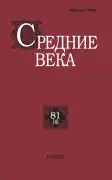THE «ENIGMA» OF STRAUSSIAN MACHIAVELLI
- 作者: Youssim M.A1
-
隶属关系:
- Institute of World History, Russian Academy of Sciences
- 期: 卷 81, 编号 4 (2020)
- 页面: 186-193
- 栏目: Articles
- URL: https://journals.eco-vector.com/0131-8780/article/view/630814
- DOI: https://doi.org/10.7868/S0131878020040091
- ID: 630814
如何引用文章
详细
Machiavelli is one of few Renaissance thinkers which up today causes in his readers nonantiquarian interest. His real or supposed understanding of politics provokes them to enter in polemics, and this reaction was only intensified in XX century with its upheavals and ideological struggle, its challenges to basic principles of ethics. Leo Strauss, a representative of Pleiad of German professors fled to USA from Nazi regime, wrote the works which are considered to have influenced modern American political theory. In his important book «Thoughts on Machiavelli» with rare determination he calls the Florentine the «teacher of evil». However when reading this work, where a fine and quite objective analysis of Machiavelli’s treatises is proposed, one has an disappointing impression (noticed by critics) that the author is rather sympathizing and in part imitating the founder of modern political science. So a question arises: to which extent sincere was he in his conclusions and whether his assessment of Machiavelli is completely unambiguous?
作者简介
M. Youssim
Institute of World History, Russian Academy of Sciences
Email: youssimm@mail.ru
Moscow, Russia
参考
- Бурлацкий Ф.М. Загадка и урок Никколо Макиавелли: Драматургические, исторические и социологические новеллы. М., 1977.
- Гегель Г.В.Ф. Феноменология духа // Сочинения. M., 1959. T. IV.
- Prezzolini G. Machiavelli anticristo. Roma, 1954.
- Strauss L. Thoughts on Machiavelli. Chicago, 1978 (1 ed.1958).
补充文件








